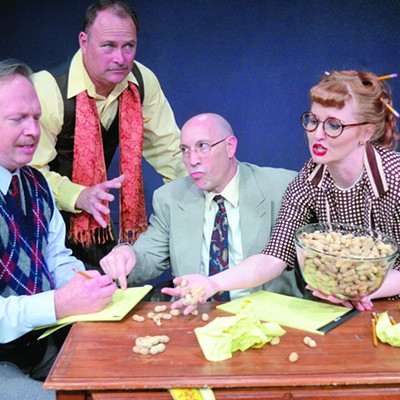Edith Frost, The Zincs, Little Sisters of The Poor
Plush, Friday, April 7Edith Frost is a bard of the small-scale events and notions that make up a fairly ordinary life. She sings in the way you or I might sing to our own hearts. It's an arresting combination; you find yourself rooting for her, feeling a personal stake in her performance. The fact is, as much as it seems like she might miss the next note, she never does, and her everyday images are everlasting, reflecting rare artistry in simplifying complex emotions.
The smallish, night-before-Club CrawlTM crowd at Plush included a passel of former and visiting Chicagoans, some of whom, incredibly, had never seen Frost perform in their common hometown. They stood as rapt as everyone else during her delivery of the enchanting "A Mirage," which she's performed live for a while, but finally appears on her current release, It's a Game. The song is a subtle, country-folk waltz with a melody that could be straight out of the Tom T. Hall songbook. Its lyrics define the sad moment when you realize your "true love" is a figment of your imagination.
As if ambivalent, she next sang "Love Is Real" from her 1999 release by that name, a song of excitement waiting for that afternoon phone call to talk about nothing. More than half the set were favorites from her earlier releases, reaching back as far as 1998's Telescopic for the hopeful "Falling," with its compelling chorus, "We can go on forever."
Frost shared a backing band with fellow Chicagoan Jim Elkington, who performed solo as The Zincs when opening for Freakwater's recent date at Plush. Elkington's opening set featured Frost's longtime accompanist, and the Chicago indie scene's first-call bassist, Ryan Hembry, on backing vocals; Frost sang on three songs. Half the set comprised songs from The Zincs' 2005 Dimmer, while the rest was not-yet-released material, including the edgy, mildly paranoid "Thin Towel."
Elkington's music covers territory compatible with Frost's, but it stretches from really pretty balladeering to math-rock and the occasional feedback flavor, to low-key, Tortoise-like experimentation. Amplifier workout duty fell to first-opener Little Sisters of the Poor, the David Slutes incarnation in which he plays acoustic guitar and sings country rock originals mixed with Madonna and Bauhaus covers. Slutes seems to reserve his more thoughtfully emotional songs for this lineup, which made the Little Sisters a good fit for the bill. Might we one day witness Slutes the solo-acoustic singer songwriter?












